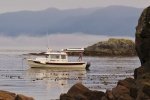RobMcClain
Member
- Joined
- May 21, 2012
- Messages
- 357
- Reaction score
- 0
- C Dory Year
- 2006
- C Dory Model
- 23 Venture
- Vessel Name
- Freedom
I agree with all the thoughtful points that have been raised in this post. With that said, I would like to offer what I see as another benefit to having the ability to transmit an AIS signal. I’m an old guy and will be doing a lot of solo boating in the PNW, primarily on the Columbia and it’s tributaries. I have kids that love and understand boating, but they still worry about their dad being by himself if something were to go wrong medically, or with the boat, that prevented use of the VHF or cell phone. Having the transmit capability allows your location to be seen by others, not just other boats, and that could be quite beneficial. When at home I often open my AIS app just to look at areas and see who is where. I watched Colby when he was cruising the Columbia not long back. So by transmitting an AIS signal, if my kids know my float plan and don’t see any movement and also can’t reach me, they can make an appropriate call seeking assistance (if deemed necessary), and my location can then be easily found. While I’m not worried about this, it does seem like a nice additional safety feature. I might not have thought this through properly so if I’m off base please say so…
Rob
Rob

